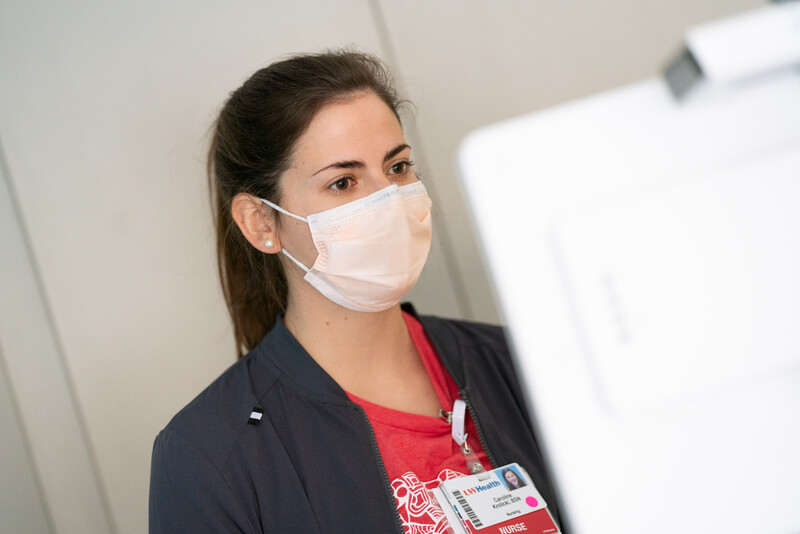
How long is the Nurse Residency Program?
The nurse residency is a prestigious 12-month program designed to help nurses move confidently into practice. While in the program, Inpatient Nurse Residents will meet once per month and Ambulatory Nurse Residents will meet twice per month.
How often do you offer the Nurse Residency Program?
Ambulatory start dates
- Sept. 9, 2024
- Feb. 24, 2025
Inpatient start dates
- June 17, 2024
- July 15, 2024
- Aug. 12, 2024
- Sept. 9, 2024
- Nov. 4, 2024
- Jan. 27, 2025
- Feb. 24, 2025
What is the orientation period for the nurse residents?
Twelve to 26 weeks, depending on the acuity of the practice area.
Which units are available for nurse residents?
We hire nurse residents into all inpatient units, the Emergency Department, Operating Rooms and several ambulatory settings. Unit descriptions are available for your review:
How does the placement work after being accepted into the program?
As part of our application process, we have applicants complete a clinical interest inventory. We try to place nurse residents in an area that interests them, though it cannot always be guaranteed.
Is there a time commitment after completing the program?
There is no time commitment after completing the program. Upon completion of the year-long residency, you will be eligible to apply to transfer to another unit for which you meet qualifications. Prior to completion of the year-long program on your assigned unit, you will not be eligible to transfer.
If I am hired into the Nurse Residency Program, will I be paid and eligible for benefits?
Yes, nurse residents are paid and are eligible for benefits. View our benefits page for additional information on benefits of working at UW Health.
Do you offer shift and weekend differentials in the Nurse Residency Program?
Inpatient nurse residents receive a shift and/or weekend differential as appropriate. Ambulatory nurse residents work during standard business hours and do not receive a shift differential.
Is the Nurse Residency Program accredited?
Yes, our Nurse Residency Program has been accredited by the Commission on Collegiate Nursing Education since 2011. Through this rigorous process, UW Health has demonstrated that it meets national standards for its program to support new nurses during their first year of practice.
What does the program look like?
Nurse residents will attend monthly residency classes with their cohort. You will meet with clinical experts and problem-solve clinical challenges and learn more about resources to support your practice.
Eligibility Requirements for UW Health Nurse Residency Program
Is there a GPA requirement to apply for the Nurse Residency Program?
No, there is not a minimum GPA to apply to the program. However, submitting your current unofficial transcript is part of the application process because we do take your Nursing GPA into consideration.
How long after graduation may I start the program?
Candidates must start the program within 12 months of graduation.
Do I need to complete an additional application for the Nurse Residency Program?
Yes, there is a supplemental application that you need to complete as part of the online application. Please go to Applying to the Program for additional information.
Is the Nurse Residency Program open to all new graduate nurses?
Yes, the Nurse Residency Program is open to all new graduate nurses with an Associate Degree in Nursing or Bachelor’s in Nursing Degree.
I just graduated with my Associate Degree in Nursing. Do I need to complete a Bachelor’s in Nursing?
Although you are not required to complete your BSN, UW Health strongly supports a culture of learning for ongoing professional development. There are many resources to support low-cost BSN completion available to you. Evidence supports a higher percentage of BSN-prepared nurses in a complex academic medical center leads to better patient outcomes.
What certifications are required before starting the program?
Nurse residents are required to be BLS-certified and provide a copy of the Basic Life Support for Healthcare Providers card prior to starting the program. We only accept certifications from American Red Cross or American Heart Association.
